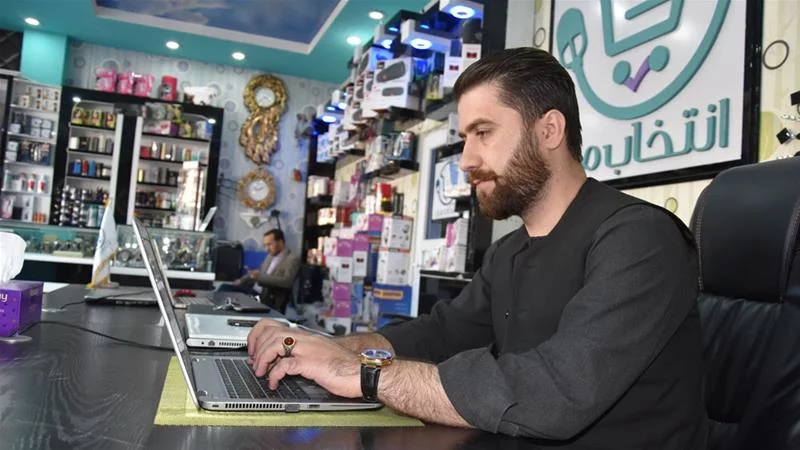Internet, Technology December 4, 2018
Short Link:Young tech-savvy Afghans switch to online shopping
Afghans shun crowded bazaars to shop online, but fragile security and an old address system complicate business.
Ariana News Agency – It is a bright and chilly Sunday morning with barely any traffic in the Afghan capital, Kabul, and Abdul Waheed is already busy at work.
Two years ago, 30-year-old Waheed and 11 of his friends founded one of the first online shops in Afghanistan, Entekhab Man.
With most Afghans preferring to shop at local markets, many doubted it would be a success.
“We knew it was going to be difficult but never imagined how hard it was going to be,” he told Al Jazeera from their main shop in Kabul’s Taimani area.
“It took us one year to convince people that it is okay to buy things online, to reassure them that they did not have to come to the store to buy goods,” he said, as he prepared to ship orders placed that morning
Realising the daunting task facing their business venture, Waheed and his partners placed advertisements on local radio and TV stations.
“Slowly after that, we started seeing more and more customers. We also started getting positive feedback from people,” he said.
With many young Afghans using Facebook, Waheed and his business partners opened an account on the social media site, created a website and launched an app.
Word spread and they started receiving phone calls from people living outside Kabul.
Waheed and friends came up with a solution – they sent goods by bus.
“We started sending orders to provinces outside Kabul. It was very difficult sending orders by bus. But it reached our customers within two to three days,” he said.
On a slow day, Entekhab Man receives at least 50 orders.
The young entrepreneurs, who invested $300,000 in the business, say they were motivated by Amazon’s business model and have opened two more shops – one in the country’s third largest city, Herat, and another in Mazar-i Sharif – the fourth largest city.
Parwez Ahmadi, 28, ordered a watch from Entekhab Man. He says he could not be happier with the service he received, he is now a repeat customer.
“I got familiar with online shopping through the internet two years ago. It was winter and I bought a coat from them that was really warm,” Ahmadi told Al Jazeera.
“They sent me exactly what I saw on their website. Now I tell people to do online shopping. It is easy and you don’t have to leave your house,” he added.
The business now employs 20 people and has plans to expand. With the success of Entekhab Man, other online enterprises have flourished.
Afghan Mart opened its doors more than a year ago in Kabul, selling everything from utensils to beauty products in the Parwan 3 area.
“Most people place their orders through our Facebook page. We then deliver to them within two hours if it is in Kabul. We deliver everywhere. We deliver to the furthest places in our country within three days,” Ismatullah Azizi, who opened the shop with three other friends, told Al Jazeera.
Its clientele is young, tech-savvy and seeks convenience.
“Most of our customers are young. Sixty-five percent are under the age of 30 and have no time to come to the store,” the 27-year-old added.
Across the country, there are now at least six online businesses and the number is expected to grow in the coming years.
But there are plenty of challenges.
“There is no reliable online payment service here in Afghanistan. People only pay us after we deliver the items, which is not good. Also, unlike say America or Europe, there are no fixed addresses here, so it takes a bit longer finding the location and delivering the goods,” Azizi said.
And that’s not the only hurdle.
Afghanistan’s security situation is fragile, 17 years after the Taliban were pushed out of office.
“Many times, there are explosions and suicide bombings and that leads to roads being closed for a whole day. When that happens, we cannot deliver the goods and our customers call and complain,” Waheed said.
Analysts say the situation has boosted online shopping.
“Insecurity is one of the main driving forces behind this phenomena. It is safer than going out to do shopping. People receive what they ordered in a secure manner,” Taj Muhammad Talash, a Kabul-based economist, told Al Jazeera.
According to Talash, online shopping has a long way to go before it can fully compete with high street shopping.
But despite the challenges, the young entrepreneurs say they are just getting started.
“This is our country. We have to believe in it,” said Azizi, Afghan Mart’s co-owner. “Only us the young people can improve our situation and that can only happen if we believe in our country and invest in it.”
